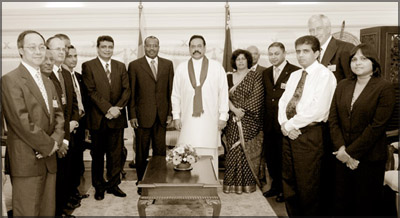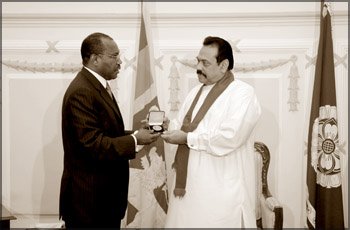|
Growth and latest developments in ICT in Sri Lanka:
ICT for a knowledge-based society
By Indeewara THILAKARATHNE
[email protected]
Q: In a world of fast
changing technologies, how do you perceive the Sri Lankan ICT sector and
its phenomenal growth momentum in the past few years?
A: ICT is something that Sri Lanka can be proud of. Like the
introduction of open economy, Sri Lanka liberalized this industry way
back in 1996. As a result, of liberalization of the industry, giant
global competitors in the Telecommunication industry came into the scene
and made a substantial investment in terms of ICT
|
In an
exclusive interview with Sunday Observer, Priyantha
Kariyapperuma, Director General of Telecommunication Regulatary
Commission reveals myriad benefits that development of ICT in
Sri Lanka could bring about even in remotest hamlets and
dramatic change that it would make in the lives of thousands. He
observes that ICT will not only revolutionize the very thinking
of the people but also substantially contributes to long-term
economic growth. |
infrastructure development introducing state-of-the-art
technology into the industry.
|

President Mahinda Rajapaksa met CEOs of leading players in ICT
industry at Temple Trees resently . |
Together with technology, private sector also demonstrated their
efficiency in executing their operations in the country. The private
sector investment and infusing efficiency into the industry is the key
to today’s development in the industry.
For instance, GSM technology, which is one of the best and efficient
technologies for mobile communication, has been introduced for the first
time to Sri Lanka as early as in 1995. Thus, Sri Lanka became the first
country in SAARC to use GSM technology.
This is true to even 3G and now HSPA technology. We are always ahead
of the region in terms of introducing state-of-the-art telecommunication
technologies.
Q: Now every other
person has a mobile phone and there was a time when a fixed line was
considered as a status symbol. Against such backdrop, how do you analyze
present trend of increasing use of mobile phones and ICT in Sri Lanka?
A: A remarkable factor is the level of penetration which,
according to predictions, has been unprecedented. Within the last few
years, level of mobile phone penetration has risen from 20 per cent to
nearly 50 per cent.
Speed of penetration is extremely high. At present, Sri Lanka has
around ten million mobile phones in operation.
When CDMA phones and fixed lines are added to the mobile phones, the
figure will stand at thirteen million. This is a remarkable achievement.
Thirty or forty years ago, to possess a telephone was a privilege.
Privileged segments of the population such as government bureaucrats and
politicians only enjoyed the privilege of having a telephone. There were
a lot of restrictions on communication. Today, the situation has
changed. Nearly two million people are working abroad.
Those migrant workers will miss their relatives in Sri Lanka creating
many social issues if there are restrictions on communication.
Access to information is a human right.
Then, there is the issue of how one can communicate. One communicates
through technology. Because of this, the term Information Communication
Technology came into being. Earlier, it was known as Information
Technology (IT).
Q: Considering the fact that there
are healthy trends and latest technologies in Sri Lanka, what is your
view on the growing Sri Lankan market for ICT?
A: I Consider Sri Lanka as a model market for the
telecommunication industry and also a model state for research and
development. When you consider infrastructure facilities like highways,
electric railways, nuclear power or alternate power, Sri Lanka is little
behind other countries. However, when it comes to telecommunication, Sri
Lanka is on par with developed countries. For this, President Mahinda
Rajapaksa should be credited.

For, it was President Rajapaksa who, for the first time, introduced
high speed internet facilities to rural areas when he was Prime Minister
through Nanasala Project.
He set up Nanasala centres in Buddhist temples in rural villages
which were not connected to telephone grid and the high speed internet
facilities were provided through V-sat disk.
Using satellite technology, one can communicate and access internet
through V-Sat. Nanasala project was launched in the immediate aftermath
of the tsunami.
The project proved its values even in emergency communication when
foreigners came to help Sri Lanka in IDP (Internally Displaced Persons)
camps where internet facilities were available.
President keeps TRC and ICPA under his wings because he knows the
potential that the telecommunication industry has and its impact on the
GDP growth.
I must thank the private sector and SLT which was earlier hundred
percent owned by the government. The foreign investors joined hands with
SLT and improved the efficiency and introduced new technologies. They
also demonstrated ways and means of using ICT.
Broadband for all
They were not hesitating to invest heavily in the industry. Now these
investors are making money. Now in the Sri Lankan mobile phones market
there are four major players; two Malaysian players, a Swedish, Hong
Kong and Indian player will join the fray. Basically, Sri Lankan mobile
market will be a saturated market. However, the competitors can
introduce diverse technologies to give broadband facilities over voice.
Voice is the basic.
Once the broadband facilities are in the rural areas people have
access to internet. People can become a part of the governance.
They can be a part of e-governance, e-commerce, and e-health. For
instance, a person in Moneragala can channel a doctor and even pay from
there before coming to Colombo for consultation. When the mobility of
people is reduced, people can use that time for economic activities. In
short, as Dr. Arthur C. Clarke said, “Do not commute, communicate”,
people can save time. As a regulator my role is to regulate the industry
for the betterment of the subscriber or public and also facilitate the
operators for them to carry out operations without hindrance and red
tape.
As regulator we are facilitating service providers and encourage new
technologies to come.
At Present, we are working on a new Communication Act considering the
fact that media and communication is converging.
In a converged environment, all the technologies come together. For
instance, in the telephone, one can listen to the radio, watch
television, and use it as a computer and a camera, send pictures and
data. Sometimes, voice becomes an accessory. So there is a need for
regulation. Countries like Malaysia, Thailand and South Korea have
brought all the regulatory mechanisms under one umbrella which makes
regulation easy.
As one body regulates, it will make accessibility easy by allied
fields such as media, telecommunication and IT.
We have already brought in amendments and are designing a new
Communication Act which will be in operation by next year.
International Telecommunication Union which is the oldest UN agency
was established in 1885. On an invitation by President Mahinda Rajapaksa
ITU Secretary General Dr. Hamadoun I Toure visited Sri Lanka. Another
significant event was that GSM Association hosted its 25th anniversary
sessions in Colombo and Dr. Hamadoun delivered the keynote address and
Sri Lanka became the chair of the Association. Experts in ICT from 27
countries came to Sri Lanka.
Combating cyber crimes
Q: Did the ITU recognize the
development of ICT industry in Sri Lanka?
A: In recognizing the singular contribution President
Rajapaksa made to ICT industry, ITU Secretary General Dr. Hamadoun
presented a medal of excellence in telecommunication to the President.
He has recognized the President’s keen interest and contribution in
ICT industry and his initiatives to curb cyber crimes and cyber
security.
|

Here ITU Secretary General Dr. Hamadoun I Toure presents a medal
of excellence in Telecommunication to President Mahinda
Rajapaksa. |
For instance, President instructed TRC to filter all the phonographic
sites in order to protect children. There will be no access to
phone-sites in future from Sri Lanka. President has made an initiative
to introduce cyber security against cyber war in cyber space as a
policy.
When President met all CEOs of all telecommunication companies
together with ITU Secretary General Dr. Hamadoun at Temple Trees where
Dr. Hamadoun pledged his support for the development of
telecommunication industry in Sri Lanka by way of technological support
and assistance for the launch of the first communication satellite from
Sri Lanka in honour of Dr. Arthur C Clarke. As TRC is member of ITU, ITU
supports various initiatives of TRC.
Q: what is the rational behind
registering mobile phones and is it an initiative to restrict individual
liberty?
A: TRC has “recently introduced” some security to be taken by
the service providers to register mobile phones. That action was taken
purely for public safety and also considering national security. When
there is no proper owner for mobile connection and telephone, it can
lead to malpractices and crime. In order to maintain accountability,
registering phones is a must.
This step has been taken for public safety and combating crime
committed using cellular phones and not to restrict individual liberty.
It is pertinent to mention here when a prison cell was searched,
police found 32 mobile telephones with another 12-15 extra SIM cards. In
another case, ransom has been demanded from a prison cell in
Anuradhapura. So, the prisoner had two mobile telephones and 15 SIM
cards with the connection. We asked the entire operators to update their
data bases and to announce to the public to register their phones.
So, public should consider it as a safety measure especially in a
situation where mobile phones are used for committing crimes and for
terrorist activities.
Q: what are the measures that have
been taken to improve the ICT infrastructure in Sri Lanka?
A: Fiber Optic network is the backbone for ITC. We are
promoting that in Sri Lanka. At the same time wireless solutions can be
introduced; Wimax and Wi FI and next generation networks can provide
solutions and high speed internet connectivity. However, as a country it
is better to have a fiber optic network as electricity and pipe-borne
water. This is one of the reasons that Sri Lanka needs to have a
communication satellite.Broadband connection will also facilitate online
education. For instance, University of Colombo has introduced a degree
where SLT is providing the service from its mobile arm Mobitel and
broadband connection and laptop was given to students and students can
register with the university for learning Programmes. If one wants to
qualify in ITC, one can study online.
Government will connect thousand schools under School Net Project.
Students can get lessons online, browse internet.
For instance, in Malaysia ten thousand schools have been connected.
This School Net which will act also intra-net and subject matter could
be transmitted to the system.
Naturally, when internet and ITC is introduced in a mass scale,
filtering of unaccepted sites such as porn sites is necessary. So, the
President’s initiative is timely. ‘Nanasala’ (Knowledge Centre) is an
e-library.
Convergence of diverse technology is a reality. Regulatory role is
vital especially in a liberalized environment.
Conducive environment for investment
Sri Lanka offers the best environment for investments in ICT industry
in the region. If investors want to introduce new technology as a trial
and research on that Sri Lanka is the ideal place for that. This is why
I always encourage research and development and laboratory facilities
where research can be conducted. Sri Lanka can produce ICT academics. If
one considers South Korea’s development, it was an ICT evolution. South
Korea now produces mobile phones, computers, and ICT screens.
Sri Lanka can progress not only in the manufacturing sector of ICT
related goods, but also in areas like BPO industry.
High speed internet connectivity is the key element in Business
Process Outsourcing. It should be mentioned here that ITU Secretary
General Dr. Thama Toure mentioned the fact that “Ten growth in the
mobile penetration induces 1.2 per cent growth in the GDP”. This alone
shows how influential ICT industry is.
Present growth momentum will continue. It will take one and half
years. Once the market reached maturity, then Sri Lanka can introduce
technologies like Mobil Number Portability (MNP) where a customer can
maintain a one number and use any network.
R and D for indigenous knowledge base
Through research and development Sri Lanka, in the long run,
developed its own indigenous knowledge base. If country invests heavily
in researches in universities, for instance in University of Moratuwa
and University of Colombo, researches if developed new technologies, can
take patent for them. This is how Japan and Korea leap forward in their
economies. Since Sri Lanka has human resources Sri Lankan scientists can
come out with innovations.
TRC has given clearance for VOIP (Voice over IP) in Sri Lanka.
BPO industry is already firmly rooted in Sri Lanka and several
renowned companies are operating their back offices in Sri Lanka. TRC
has opened a separate section for BPO industry where the companies can
register with TRC and obtain telecommunication services through TRC. BPO
is one mode of curbing brain drain. |
